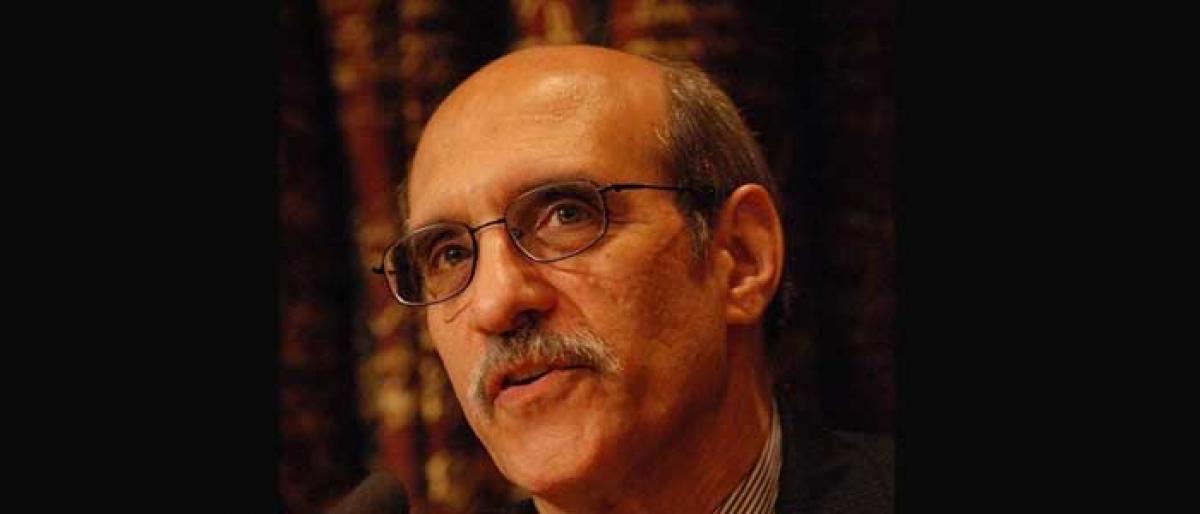Live
- GMR Airports Unveils AI-Powered Digital Twin Platform to Transform Airport Operations
- India poised to become leading maritime player: PM Modi
- Top Causes of Kidney Stones and How to Recognize Silent Symptoms
- India’s renewable energy capacity logs 14.2 pc growth at 213.7 GW
- Winter Session of Odisha Assembly adjourned sine die
- Biden calls Trump's tariff approach 'major mistake'
- After Drama Over Eknath Shinde’s Chief Minister Race, Maharashtra Cabinet Formation Faces New Tensions
- Egyptian FM, Blinken discuss recent developments in Syria
- Iran's supreme leader says Syria's developments result of US-Israeli 'plot'
- Elon Musk to Purchase $100 Million Luxury Mansion Next to Donald Trump's Mar-a-Lago, Report Reveals
Just In

Professor Martin Chalfie, Nobel laureate in chemistry, urged the researchers, teachers and scientific community to come together to check the predatory research journals.
Hyderabad: Professor Martin Chalfie, Nobel laureate in chemistry, urged the researchers, teachers and scientific community to come together to check the predatory research journals.
Prof Martin Chalfie was delivering a lecture as part of the Hyderabad Lecture Series -3, held at the University of Hyderabad here on Monday. He stressed on the importance of holding discussions on science in journal clubs, instead of opting to publish research papers in the 'predatory journals’ engaged in the pay-and-publish model.
The Nobel laureate appealed to the scientific community to publish their research papers in peer-reviewed journals apart from making their ideas accessible to all through preprint server for biology like bioRxiv.org.
This, Chalfie said, would speed up biological research and ensure proper review. Such information coming from a recognised scientists like professors and others in the scientific community would help in sharing the ideas as well as benefit the students studying in the field and hone their skills.
Instead of focusing entirely on his prizewinning research, he delivered lecture on his current work, entitled as “Guarantor transcription factors in cell differentiation,” using Caenorhabditis elegans as a model organism.
Prof Martin Chalifie highlighted six different neuronal cells which play a pivotal role in the touch reception in C. elegans, specifically about the different levels of regulation of the cell differentiation and cell fate.
The robust expression of these touch receptor neurons, he said, is ensured by redundancy in the occurrence of enhancers, binding sites and the transcription factors which can overlook certain mutations to allow consistent expression. The identification of UNC-86/MEC3 gene dimer by professor Chalfie and his team has answered many questions on the development of touch function genes in C.elegans.
"Mec-3 once activated by UNC-86, acts both as an enhancer of touch gene expression as well as appositive autoregulator, maintaining its own level in the cell. This Mec-3 dependent gene expression enhancement is guaranteed by Alr-1, a transcription factor identified by a postdoctoral fellow in his lab, the loss of which has yielded in variable touch insensitivity." By conducting single molecule in situ hybridization team has shown the enhancement and refinement of touch receptor mRNA expression by the combined effect of UNC-86/Mec-3/Alr-1.
Further, he explained, how that Hox protein acts as the master guarantor by regulating the binding of UNC-86. In his presentation to the students, teachers and scientists from within in the university and from several other scientific institutions, universities and colleges in the city, he showcased how discovery from an unknown keep revealing yet another unknown, like one regulatory factor, led to the discovery of the next and how ultimately all such factors acted in a coordinated manner to generate robust gene expressions.
This was an important message, especially for the budding researchers, where he asserted on conducting biological research exploring the unknown. The lecture series was jointly organised as part of the Hyderabad Lecture Series 2018 Sponsored by the Insurance Regulatory and Development Authority (ARDAI), the School of Life Sciences, UoH. At the end of the lecture, the University Vice-Chancellor Appa Rao Podile felicitated Prof Martin Chalifie. Later, in a small interactive session, he answered various questions asked by the students and teachers on cell differentiation.

© 2024 Hyderabad Media House Limited/The Hans India. All rights reserved. Powered by hocalwire.com







